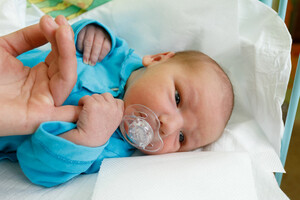- Adult Heart DiseaseDiseases of the arteries, valves, and aorta, as well as cardiac rhythm disturbances
- Pediatric and Congenital Heart DiseaseHeart abnormalities that are present at birth in children, as well as in adults
- Lung, Esophageal, and Other Chest DiseasesDiseases of the lung, esophagus, and chest wall
- ProceduresCommon surgical procedures of the heart, lungs, and esophagus
- Before, During, and After SurgeryHow to prepare for and recover from your surgery
November 11, 2019

When your child is in the cardiac intensive care unit (CICU), many care providers will be involved both before and after surgery. They will work as a team to address your child’s specific needs. Because it can be overwhelming to see so many different faces, this article will give you an idea about life in the CICU and the team members involved in your child’s care plan.
What will happen if my child is admitted to the CICU before surgery?
Your child will be given a size- and age-appropriate bed, crib, or warmer. A nurse will place stickers on your child’s chest for an electrocardiogram (EKG) monitor and then take your child’s blood pressure. Just like in a pediatrician’s office, other vital signs will be taken such as an oxygen saturation level. To obtain the “pulse-ox,” a sticker will be placed on your child’s hand, foot, finger, toes, or possibly earlobe. These stickers do not hurt, and information that comes from wires attached to these stickers will appear on a screen in your child’s room. These monitors will stay in place until your child is ready to go home.
A CICU doctor or nurse practitioner also will come to see your child. He or she will ask you questions about your child’s health history and symptoms, prior operations and/or procedures, and whether you have any records or care notebooks that you would like to share. The care team will then examine your child by listening to his or her heart and lungs, feeling pulses in the arms, legs, and feet, and gently checking the abdomen.
An echocardiogram (a test that uses ultrasound to create pictures of the heart) or x-ray usually will be completed soon after your child is admitted. A portable machine will be brought into the room by a technician who will perform the imaging. This test will not hurt your child, although many children have trouble lying still. Warm blankets, movies, toys, and other distraction techniques may be used to help your child feel more comfortable.
The nurse may start an IV for your child if he or she does not already have one. Special techniques, numbing medicine, and occasionally mild sedation are used for IV starts, depending on the circumstances. This IV will be used for medicines, fluids, and to obtain a blood sample for initial laboratory tests. The care team will try to minimize needle sticks for children whenever possible. A nasal swab will be used to test for certain bacteria, which could change the antibiotics used before and during your child’s surgery.
In addition to the CICU doctor or nurse practitioner, you likely will meet with your child’s cardiologist and cardiac surgeon. In many cases, tests will need to be reviewed by the entire cardiac team before a surgical plan is made. The cardiac surgeon will review drawings of your child’s heart and explain the planned operation and what to expect. You will review the risks and benefits of the operation and sign a permission slip for surgery. Questions related to your child’s care are welcomed!

Where will I stay? Can I sleep there?
In general, parents and caregivers are permitted and encouraged to stay with their child in the CICU. The number of visitors and siblings who can stay in the room differs by hospital, time of year (such as flu season), and age of the visitors. A pullout couch, bedding, and laundry services are provided for parents and caregivers wishing to stay overnight. Because the hospital room is not necessarily the most restful place for parents and siblings, family members are encouraged to have another option. At many institutions, a Ronald McDonald House is connected to the children’s hospital and can be a very convenient and comfortable option for housing.
Can I breastfeed my child in the hospital?
Breastfeeding before and after congenital heart surgery is encouraged whenever it is safe for your child. Some children have medical reasons why they should not be fed by mouth prior to or after heart surgery. In some situations, it may be preferable to pump breastmilk and feed your baby by bottle so that doctors and the cardiac nutritionist can carefully measure the amount of milk your baby takes in or increase the number of calories your baby receives. Your CICU team’s goal is to provide family-centered care that takes your preferences into account as much as possible.
What happens if I go home and there’s an emergency?
Because it is not possible or reasonable to stay in your child’s hospital room 24/7, your care team will ask for phone numbers to use when it is necessary to reach you. These numbers will be written on the marker board in your child’s room and included in his or her electronic medical record.
Although rare, sometimes emergencies do occur and will be handled as a team effort in the CICU; every effort will be made to reach you in case of an emergency. Please rest assured that your child will be taken care of even while you are away.
How long will we be in the hospital?
In my hospital, children stay in the CICU from admission through recovery and discharge. This helps parents, caregivers, and patients get to know the team and receive consistent, specialized care.
The total length of time your child will spend in the hospital depends on how he or she is doing. Some children have heart problems that can be repaired with a straightforward operation and may go home in 3 to 5 days. Others have complex heart defects that may require weeks in the hospital. For newborns, time spent in the hospital is often related to learning how to eat by mouth. A speech pathologist is available as needed to help with feeding tips and strategies.
For parents and families of children who are in the hospital for longer than a week or two, we often organize regular family meetings. These meetings provide a face-to-face opportunity for parents to meet with several care providers, including social workers and consulting doctors (such as a kidney doctor), and discuss care plans and goals. As a vital team member in your child’s care, you also are encouraged to participate in daily bedside rounds and offer your thoughts and feedback.
We know that having a child undergo congenital heart surgery is an enormous stressor for the entire family. It can be overwhelming, but knowing what to expect has helped many parents prepare for the emotional journey ahead. It is the cardiac team’s goal to include you as a team member in your child’s care and provide individualized support and resources along the way.
Read more about Before, Day of, and After Congenital Heart Surgery.
The opinions expressed in this article are those of the author and do not necessarily reflect the views of The Society of Thoracic Surgeons.

